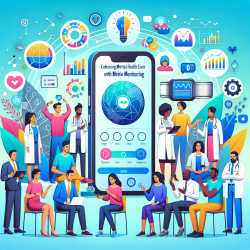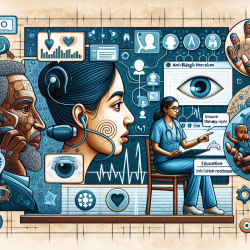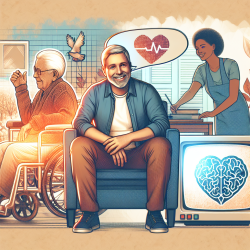The integration of technology into mental health care has opened new avenues for improving patient outcomes, particularly for those with serious mental illness (SMI). A recent study titled Clinician and Patient Perspectives on the Use of Passive Mobile Monitoring and Self-Tracking for Patients With Serious Mental Illness: User-Centered Approach provides valuable insights into how mobile monitoring can be leveraged to enhance clinical care.
The Promise of Mobile Monitoring
Mobile monitoring involves using smartphone technology to passively collect data on patients' behaviors and health status. This approach is particularly promising for individuals with SMI, as it allows for early detection of symptom exacerbations and timely interventions. The study utilized the Health Information Technology Acceptability Model to assess the acceptability and usability of such technologies among patients and clinicians.
Key Findings from the Study
- Clinician Support: While clinicians expressed concerns about increased workloads and the need for technical training, they overwhelmingly supported the use of mobile monitoring as a tool to improve patient care.
- Patient Receptivity: Most patients were open to using smartphone dashboards for self-monitoring. They appreciated the ease of use and the potential for improved self-regulation.
- Privacy Concerns: Both clinicians and patients highlighted privacy as a significant concern, particularly regarding data security and potential misuse.
- Usability Challenges: The study identified usability challenges that need addressing to ensure successful implementation, such as simplifying data presentation and integrating alerts into existing workflows.
Implementing Mobile Monitoring in Practice
For practitioners looking to integrate mobile monitoring into their practice, it's essential to consider both the benefits and the challenges identified in the study. Here are some strategies to enhance implementation:
- Training and Support: Provide comprehensive training for clinicians to familiarize them with mobile technologies and integrate them into their workflows effectively.
- User-Centered Design: Involve patients in the design process to ensure that apps are user-friendly and meet their specific needs.
- Address Privacy Concerns: Implement robust data security measures and communicate these clearly to patients to build trust.
- Cultural Sensitivity: Recognize that some populations may have unique concerns or barriers to adoption, such as older adults or those experiencing homelessness.
The potential of mobile monitoring in transforming mental health care is significant. By addressing the challenges highlighted in the study, practitioners can harness this technology to provide more responsive and effective care for individuals with SMI.
To read the original research paper, please follow this link: Clinician and Patient Perspectives on the Use of Passive Mobile Monitoring and Self-Tracking for Patients With Serious Mental Illness: User-Centered Approach










